Staging Injustice Film Series: L’albero degli zoccoli by Ermanno Olmi
March 03, 2022
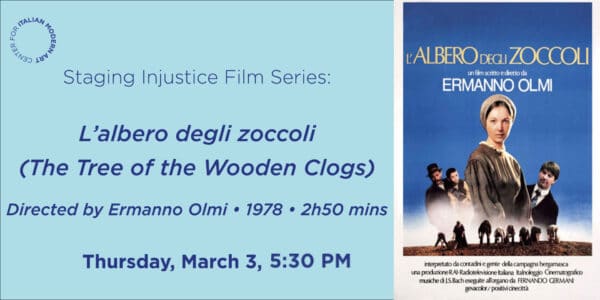
An in-person screening of Ermanno Olmi’s “L’albero degli zoccoli” surrounded by works of Italian modern art!
The second film in our Staging Injustice Film Series, L’albero degli zoccoli (The Tree of the Wooden Clogs, 1978) is directed by Ermanno Olmi and stars Luigi Ornaghi, Francesca Moriggi, and Omar Brignoli.
Synopsis (via IMDB): The life inside a farm in Italy at the end of the 19th century. Many poor country families live there, and the owner pays them by their productivity. One of the families has a very clever child. They decide to send him to school instead of make him help them, although this represents a great sacrifice. The boy has to wake up very early and walk several miles to get to the school. One day the boy’s shoes break when returning home, but they do not have money to buy another pair. What can they do?
THIS IS AN IN-PERSON SCREENING AT CIMA.
Please note: the screening will begin at 5:30PM, with an introduction by Prof. Stefano Albertini (NYU).
Stefano Albertini is a native of Bozzolo in the Northern Italian province of Mantua. He studied at the Università di Parma, where he majored in Political History. After obtaining his M.A. in Italian Literature from the University of Virginia he was admitted to Stanford University where he earned his Ph.D. with a dissertation on the rethoric of violence in Niccolò Machiavelli’s writings.
He has published extensively on topics ranging from Dante to Renaissance Literature, to Church/State relations during fascism. Since 1994, he has been teaching literature and cinema in the Department of Italian Studies at New York University. He frequently contributes to Criterion Collection as an expert on Italian film, with interviews on Bellocchio, Matarazzo, Visconti, and Moonstruck. From 1995 to February 1998 he was Associate Director of Casa Italiana Zerilli-Marimò and since then he has served as Director.
General Admission: $10
CIMA Members and Students with valid ID: $5
Public Programming at CIMA is made possible with the generous support of Christie’s.

Drawing Night at CIMA!
February 25, 2022

A chance to get up close and personal with art!
CIMA opens its unique and intimate setting to artists, students, and others interested in trying their hand at studying works from Staging Injustice: Italian Art 1880-1917 through drawing — interacting with, analyzing, and drawing inspiration from the artworks.
Materials will be provided and all skill levels are welcome!
6pm – Registration and short guided tour of the exhibition
6:20pm – Introduction by Beatrice Scaccia
6:30-7:30pm – Drawing in CIMA’s galleries
7:30pm – Discussion
8pm – Evening concludes
Bea Scaccia

Lives and works in New York. She received her MFA from the Academy of Fine Arts in Rome, and studied animation at the School of Visual Arts in New York. Her works are included in public and private collections – such as the William Louis-Dreyfus Foundation and the Portland Museum of Art – and, most recently, have been exhibited at the Katonah Museum of Art (2021, New York), Magazzino Italian Art (2020, New York), Pen + Brush (2020, New York), and The Center for the Less Good Idea (2020, Johannesburg), among others.
Public Programming at CIMA is made possible through the generous support of Christie’s.

Educating by Design: Maria Montessori, Beauty, and Pacifism
February 24, 2022
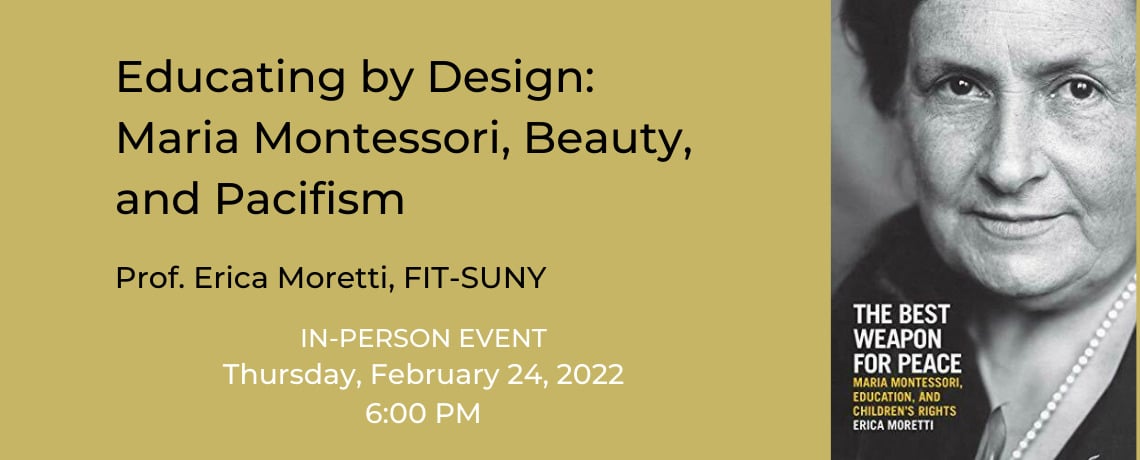
An in-person lecture with author Erica Moretti on Maria Montessori’s collaboration with artists, feminists and social reformers.
In this lecture, Erica Moretti, author of The Best Weapon for Peace: Maria Montessori, Education, and Children’s Rights (UW Press, 2021) explores Montessori’s early collaborations with artists, feminists, and social reformers such as Sibilla Aleramo, Duilio Cambellotti, and Alessandro Marcucci, unearthing the eclectic foundation of the educator’s pedagogical approach. A contemporary of most of the artists in CIMA’s current exhibition, Staging Injustice: Italian Art 1880-1917, Montessori dedicated her life and work to the same children, whom she referred to as ‘neglected citizens’, who are represented in the exhibition artworks.
General Admission: $15. Members and Students: Free.
About the speaker:
Erica Moretti is an Assistant Professor of Italian at the Fashion Institute of Technology-SUNY. Her research — rooted in biopolitics, gender and sexuality studies, and critical theory — focuses on pacifism, refugees and displacement, and humanitarianism in Modern Italy. She has published on Progressive-era assimilation policies in the United States, on the Italian feminist movement, and on Italian colonialism, among other topics. Moretti’s first book, The Best Weapon for Peace: Maria Montessori, Education, and Children’s Rights (University of Wisconsin Press, 2021), reframes Montessori’s pacifism as the foundation of her educational activism, emphasizing her singular vision of the classroom as a springboard to reshaping society. Moretti is currently working on Family Reunifications at the End of the Empire, an inquiry into how population movements (including displaced children) have tested the boundaries of diplomacy, humanitarianism, and decolonization. Taking as its departure point the children of Italian nationals in Libya, the book examines postwar transformations in theories of kinship and of women and children’s rights, within the analytical framework of Catholic humanitarianism.
Moretti’s work has been supported by awards and residential fellowships provided by the Barbieri Endowment Grant in Modern Italian History, the Center for Italian Modern Art, the Center for European and Mediterranean Studies (NYU), the Remarque Institute (NYU), the Leonard Hastings Schoff and Suzanne Levick Schoff Memorial Fund (Columbia U), and the Laura Bassi Foundation. She is the recipient of the SUNY Chancellor’s Award in Scholarship and Creative Activities. Moretti has written on European history, politics, and ideas for various magazines and newspapers, including The Washington Post and Il Manifesto.
Public Programming at CIMA is made possible with the generous support of Christie’s.

Staging Injustice Film Series: Novecento by Bernardo Bertolucci
February 17, 2022
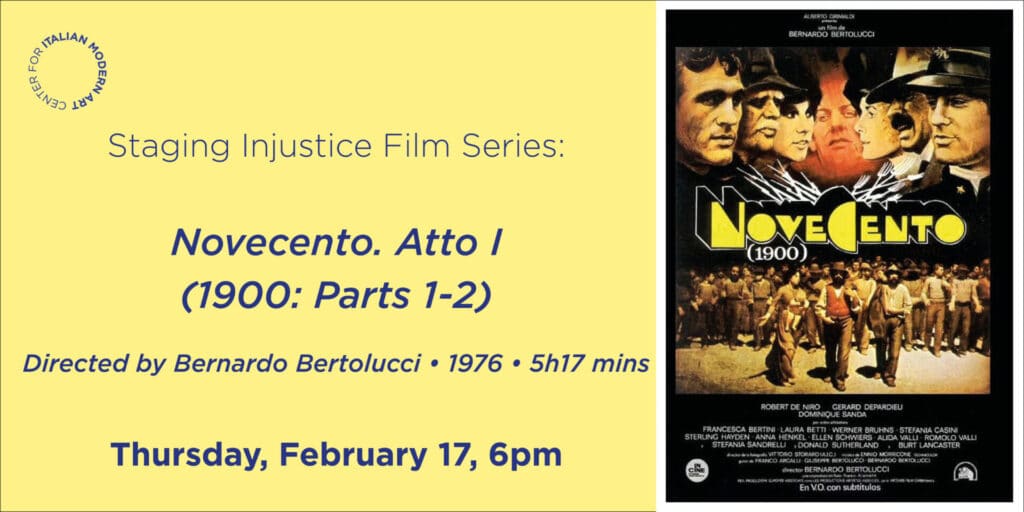
The inaugural film of our Staging Injustice Film Series, Novecento (1976) is directed by Bernardo Bertolucci and features Robert De Niro, Gérad Depardieu, and Dominique Sanda.
Synopsis (via Wikipedia): Set in Bertolucci’s ancestral region of Emilia, the film chronicles the lives and friendship of two men – the landowning Alfredo Berlinghieri (De Niro) and the peasant Olmo Dalcò (Depardieu) – as they witness and participate in the political conflicts between fascism and communism that took place in Italy in the first half of the 20th century. The film premiered out of competition at the 1976 Cannes Film Festival.
*Please note: the film is divided into two parts. The first part will be screened on Feb. 17 at 6pm, and the second part will be screened the following day at 6pm.
THIS IS AN IN-PERSON SCREENING AT CIMA.
General Admission: $10
CIMA Members and Students with valid ID: $5
Public Programming at CIMA is made possible with the generous support of Christie’s.

Staging Injustice Film Series
February 04 - June 09, 2022
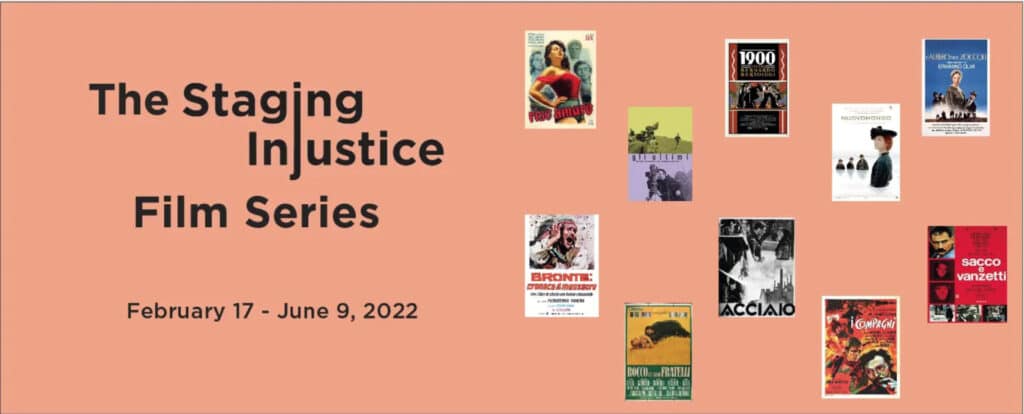
During Winter and Spring 2022, the Center for Italian Modern Art will present a series of ten Italian films (some of which were never distributed in the US) with the aim of enriching the questions and themes evoked by our current exhibition, Staging Injustice: Italian Art 1880-1917. All ten films in the series examine different aspects of the so-called “questione sociale”, which initially developed in Italy towards the end of the 1800s, and reverberated in Italian cinema throughout the 20th century. Topics include, but are not limited to: immigration, agrarian labor, anarchist and socialist class struggle, and the treatment of women.
ALL SCREENINGS ARE IN PERSON AT CIMA
Single film tickets: $10 General Admission / $5 CIMA members and students (a 50% discount!)
List of Screenings*:
Thu., Feb 17, 6pm: Novecento. Atto I (1900: Part 1-2). Directed by Bernardo Bertolucci (1976).
Thu., Mar 3, 5:30pm: L’albero degli zoccoli (The Tree of the Wooden Clogs). Directed by Ermanno Olmi (1978).
Thu., Mar 17, 6pm: Riso amaro (Bitter Rice). Directed by Giuseppe De Santis (1949).
Thu., Mar 24, 6pm: Bronte: cronaca di un massacro che i libri di storia non hanno raccontato (Liberty). Directed by Florestano Vancini (1972).
Thu., Apr 7, 6pm: Gli ultimi (The Last Ones). Directed by Vito Pandolfi (1963).
Fri., Apr 15, 6pm: I compagni (The Organizer). Directed by Mario Monicelli (1963).
Thu., Apr 28, 6pm: Acciaio (Steel). Directed by Walter Ruttmann (1933).
Thu., May 12, 6pm: Rocco e i suoi fratelli (Rocco and His Brothers). Directed by Luchino Visconti (1960).
Thu., May 26, 6pm: Nuovomondo (Golden Door). Directed by Emanuele Crialese (2006), with an introduction by Anthony Tamburri.
Thu., Jun 9, 6pm: Sacco e Vanzetti (Sacco & Vanzetti). Directed by Giuliano Montaldo (1971).
* While CIMA will make every effort to adhere to this calendar, occasional modification of dates and/or titles may be necessary.
All film screenings will be held in person at CIMA. Please read the Health & Safety Guidelines before your visit.
Public Programming at CIMA is made possible with the generous support of Christie’s.

Exhibiting the Holocaust and Strategies of Memory in Postwar Italy
January 31, 2022
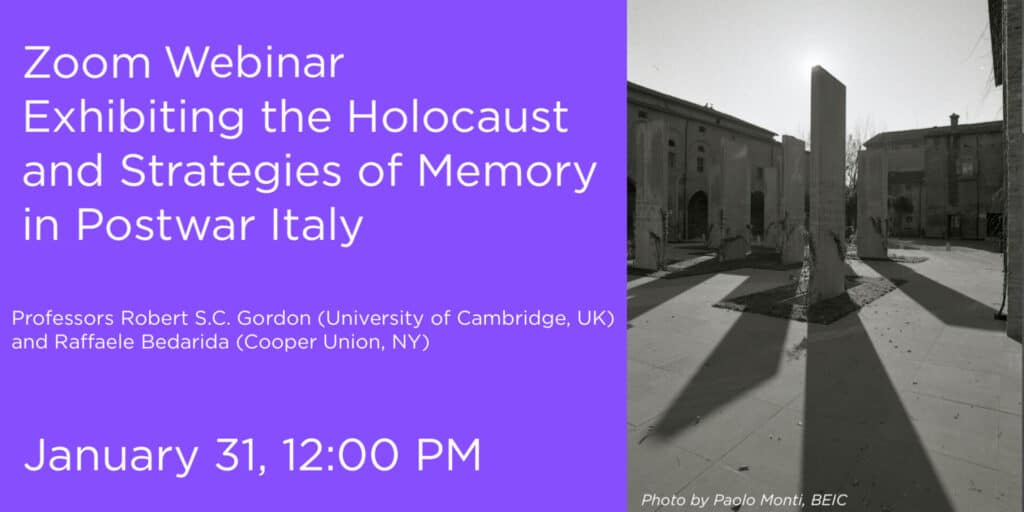
Every year the Consulate General of Italy in New York together with the Centro Primo Levi, the Italian Cultural Institute, Casa Italiana Zerilli Marimò at NYU, the Italian Academy at Columbia University, the Calandra Institute at CUNY, the Scuola d’Italia Guglielmo Marconi, Magazzino Italian Art and the Center for Italian Modern Art commemorate the victims of the Nazi-Fascist persecution with a series of cultural initiatives aimed at preserving the memory of those events and educating the younger generations, while raising awareness of racism and xenophobia.
On the occasion of the official commemorations for the 2022 International Holocaust Remembrance Day, celebrated in Italy as the Giorno della Memoria, CIMA presents a panel with Professors Robert S.C. Gordon (Cambridge University, UK) and Raffaele Bedarida (Cooper Union, New York), who will discuss their recent research on the memorialization of the Holocaust in the context of Italian public monuments and memorials. Prof. Gordon will examine the tensions and creativity that underpinned the creation of the Museo Monumento del Deportato in Carpi and the Memoriale italiano di Auschwitz, while Prof. Bedarida will focus on the Holocaust drawings by Corrado Cagli, a Jewish Italian artist who enlisted with the American army and took part in the liberation of the Buchenwald concentration camp.
The event will take place as a Zoom webinar, free to the public.
About the speakers:
Robert S. C. Gordon is Serena Professor of Italian at Cambridge University. He works on the literature, cinema and cultural history of modern Italy. He is the author or editor of a number of books, including a study of the writer and filmmaker Pier Paolo Pasolini (Pasolini. Forms of Subjectivity) and several volumes on the work of Primo Levi (e.g. Primo Levi’s Ordinary Virtues, Auschwitz Report, The Cambridge Companion to Primo Levi, Innesti). He has also published on the wider field of post-war cultural responses to the Holocaust, in the book The Holocaust in Italian Culture, 1944-2010, the co-edited collection Holocaust Intersections anda co-edited special issue of the Jewish history journal Quest. He is also co-editor of Culture, Censorship and the State in 20th-Century Italy and his work on cinema includes the book onPasolini, the BFI Film Classics volume Bicycle Thieves, DVD and Blu-ray audio commentaries, and articles and essays on diverse topics including Holocaust cinema, early film and literature, Antonioni, ‘Hollywood on the Tiber’, and Gianfranco Rosi. He is the author of a general account of modern Italian literature, A Difficult Modernity: An Introduction to Twentieth-Century Italian Literature. He has taught at Oxford and Cambridge Universities, is a former Senior Editor of the journal Italian Studies, and was elected Fellow of the British Academy in 2015.
Raffaele Bedarida is an Associate Professor of Art History at Cooper Union, New York where he coordinates the History and Theory of Art program. An art historian and curator specializing in twentieth-century Italian art and politics, Bedarida focuses on cultural diplomacy, migration, and cultural exchange between Italy and the United States. He is the author of two monographs, Bepi Romagnoni: Il Nuovo Racconto (Silvana Editoriale, 2005) and Corrado Cagli: La pittura, l’esilio, l’America (Donzelli, 2018 – English edition upcoming). He has published extensively in periodicals and edited volumes, including The International Yearbook of Futurism Studies, Oxford Art Journal, Tate Modern’s In Focus, and Artforum. For his work on the exchange between Italy and the U.S., Bedarida has received fellowships from the Center for Italian Modern Art (CIMA) and the Terra Foundation for American Art. He currently serves as a member of the advisory committee of the Massimo Campigli Archives, the Archivio Crispolti Arte Contemporanea and as the co-chair of the European Postwar and Contemporary Art Forum. His monograph, entitled Exhibiting Italian Art in the United States from Futurism to Arte Povera: Like a Giant Screen will soon be published by Routledge.
Public Programming at CIMA is made possible with the generous support of Christie’s.

Staging Injustice Opening Lecture by Curator Giovanna Ginex
January 27, 2022
During the years between 1880 and 1917, the recently-born Kingdom of Italy faced complex socioeconomic predicaments. The country’s nascent industrialization was accompanied by growing inequalities, widespread poverty in the cities and in the countryside, illiteracy, and labor exploitation. These circumstances led to years of political instability, mass protests, and to the phenomenon of mass emigration towards the Americas. Many Italian artists turned their gaze to the poorest and most destitute members of their society: thanks to their innovative, Divisionist technique, their artworks denounced with vibrant figures and colors the conditions of social classes that lived a world apart from the glamour of the Belle Époque.
In this talk, Staging Injustice curator Giovanna Ginex will examine the historical coordinates that underpin CIMA’s new exhibition, and will discuss the most important artists and artworks at the center of the show.
The event will be held both in person at CIMA and online. Limited in-person seating available due to COVID-19 safety protocols.
Before visiting CIMA, please familiarize with our updated COVID-19 safety policy and protocols.
About the curator: Giovanna Ginex is an independent art curator and art historian based in Milan. She specializes in different aspects of nineteenth- and twentieth-century art, including painting, sculpture, photography, and design. She has collaborated with many institutions in Italy and abroad. Her most recent publications include La meraviglia della natura morta, 1830–1910. Dall’Accademia ai maestri del Divisionismo, exh. cat. (Milan: Cassa di Risparmio di Tortona-Skira, 2011); “Rembrandt Bugatti: From Milan to Paris,” in Rembrandt Bugatti: The Sculptor 1884–1916, eds. Philipp Demandt and Anke Daemgen, exh. cat. (München: Hirmer Verlag, 2014); Una musa tra le ruote. Pirelli: un secolo di arte al servizio del prodotto (Milan: Corraini, 2015); Elsa Smithgall-Erica E. Hirshler-Katherine M. Bourguignon-Giovanna Ginex, eds., William Merritt Chase: A Modern Master, exh. cat. (Washington D.C. and New Haven: The Phillips Collection and Yale University Press, 2016); Giovanna Ginex, “Sono Fernanda Wittgens”. Una vita per Brera (Milan: Skira, 2018). Giovanna Ginex, Angelo Morbelli. II poema della vecchiaia, exh. cat., (Venezia: Ca’ Pesaro Galleria Internazionale d’Arte Moderna, Skira 2018); Willemijn Lindenhovius-Giovanna Ginex, eds., Sprezzatura. Vijftig Jaar Italiaanse Schilderkunst 1860-1910, exh. cat. (Assen: Drents Museum, WBOOKS, 2019) ; Giovanna Ginex, Album del Divisionismo. «Mais d’abord que sont ces ‘divisionnistes’?» (Milan: Electa, 2021). Her exhibition Divisionismo. 2 collezioni is on view at Milan’s Galleria d’Arte Moderna until March 6, 2022.
Public Programming at CIMA is made possible with the generous support of Christie’s.

Presentation of Gianfranco Baruchello’s Psicoenciclopedia Possibile
December 09, 2021
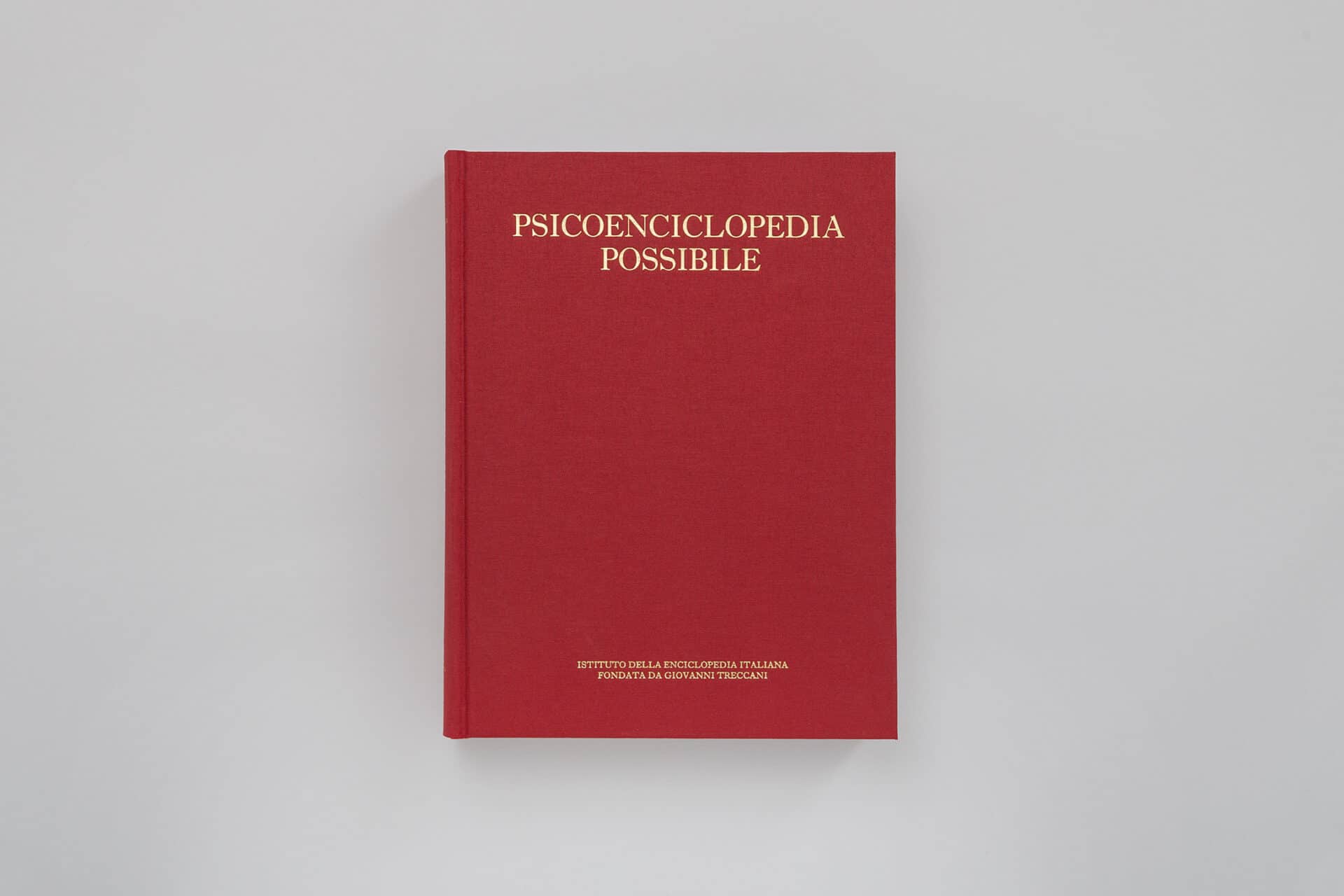
The Center for Italian Modern Art and the Fondazione Baruchello are pleased to present Gianfranco Baruchello’s Psicoenciclopedia Possibile (Possible Psychoencyclopedia) for the first time in the United States.
RSVP here.
From the late 1950s and especially from the early 1960s, Baruchello (b. 1924), a painter, writer and filmmaker, has assembled words, images or objects in a constant search for new possibilities of thought and imagination. His works include paintings, boxes/display cases and works on Plexiglas, as well as assemblage of different and sometimes recycled materials, including writing as a form of inquiry. He reduces images, words and newspaper cuttings to a state bordering on illegibility. These are aspects of his oeuvre that have made Baruchello one of the most daring and provocative experimenters of the twentieth century.

After two presentations and exhibitions in Geneva at the Centre d’Art Contemporain (September 14 – October– 17, 2021) and in Paris at the Centre Georges Pompidou (September 25 – October 24, 2021), the work will be presented at the Center for Italian Modern Art through a rich and varied one day conference to be held on December 9th. The project is produced through support from the Italian Council (VII edition, 2019), a program by the General Directorate of Contemporary Creativity at the Ministry of Culture for the international promotion of Italian art.
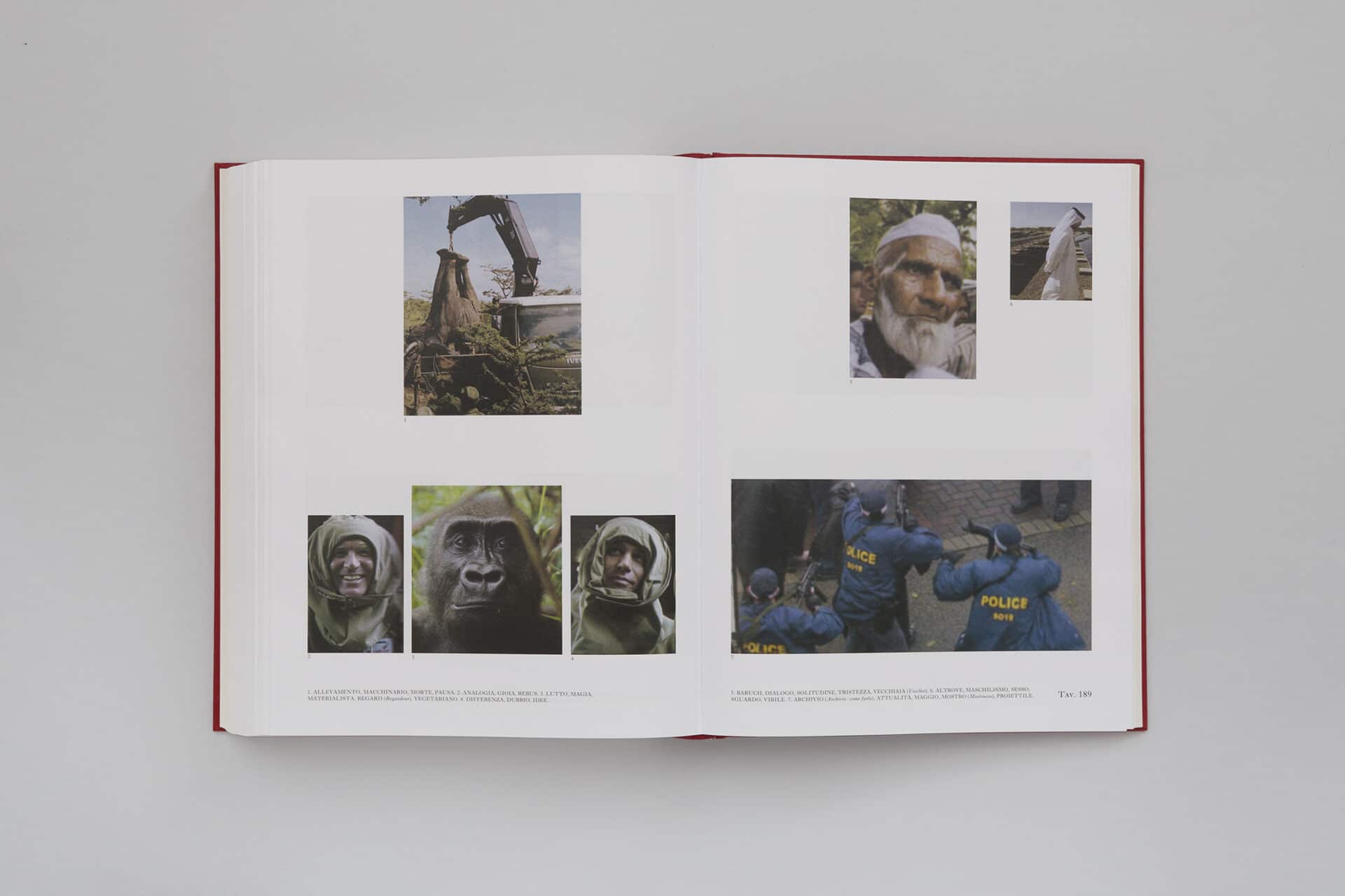
The 2020 edition of the volume Psicoenciclopedia Possibile comprises 250 copies and 15 artist’s proofs. The work is presented in a slipcase together with a print by the artist, which constitutes a sort of “reflection” on one of the plates, n° 128, and the book Note a margine. L’arte come esperimento del sapere (Marginal notes. Art as an experiment in knowledge) by Carla Subrizi, which describes the work’s origin and gives readers some possible keys to its exploration. 1,000 copies of a “pocket” edition of the volume are currently being printed.
During the conference, a series of drawings selected for the occasion will allow the public to delve into Baruchello’s complex system of thought, which, by the transversal nature of languages, has experimented with images, objects, installations, cinema and writing.
About GIANFRANCO BARUCHELLO (b. 1924)
After obtaining a degree in Law (1946), Gianfranco Baruchello experimented with painting by means of objects, constructing the first alphabets of motifs used as the foundation for his language. A number of objects, comprising books or newspapers, assembled and sometimes coated with white enamel, were exhibited in 1962 in Paris (Collages et objets) and New York (New Realists). His first solo show was held at La Tartaruga Gallery in Rome in 1963. In 1964, on occasion of his first exhibition at the Cordier & Ekstrom Gallery in New York, he exhibited painting and objects that already represented a significant milestone in his quest, such as fragmentation, distributing images reduced to their minimal elements on the canvas, the conceptual delocalization of space. From 1960 onwards he created short films: Molla (Spring, 1960), Il grado zero del paesaggio (The Zero Degree of Landscape, 1963), and Verifica incerta (Uncertain Verification, 1964-1965). In 1962, he met Marcel Duchamp, to whom he dedicated his book Why Duchamp (1985). During his experimentation with moving images, Baruchello worked on the idea of fragmentation and assemblage, concepts that led him, in the same period, to devise projects such as La quindicesima riga (The Fifteenth Line, 1966-1968), with lines of text taken from hundreds of books, and the volume Avventure nell’armadio di plexiglass (Adventures in the Plexiglass Cupboard, 1968). In 1968 he founded a fictitious company named Artiflex, whose mission was to “mimic industrial methods” with critical intentions. In 1973 he launched the project Agricola Cornelia S.p.A., an experiment involving art and agriculture, on which he worked for eight years. A writer and poet, he created projects for theater (Teatro alla Scala, Milan; Teatro dell’Opera, Rome) and in 1998, together with Carla Subrizi, he set up the Fondazione Baruchello. Baruchello has participated in the Venice Biennale on several occasions (1976-80, 1988-90, 1993, 2013) and documenta, Kassel (1977, 2012). He has had important retrospective exhibitions in Italy and abroad: GNAM, Rome (2011); ZKM, Karlsruhe (2014); Raven Row, London (2017); MART, Rovereto (2018). His works are housed in important international museums: the Guggenheim Museum and MoMA (New York); GNAM (Rome); the Philadelphia Museum of Art; Centre Pompidou (Paris); Deichtorhallen (Hamburg); ZKM (Karlsruhe); MAXXI (Rome); MADRE (Naples).
The Catalogue Raisonné of Baruchello’s work is currently being compiled.
RSVP here.

Conference Program:
14:00
Chair: Nicola Lucchi
Carla Subrizi – Why Baruchello Today?
Raffaele Bedarida – The Great Pilgrimage of Baruch
Franco Baldasso – Savinio and Baruchello: An Encyclopedic Conversation
Lara Demori -“Hypothalamic Brainstorming”: Le Possible sans le moindre grain d’éthique d’esthétique et de métaphysique
15:30
Panel discussion and audience questions
16:00
Coffee Break
16:30
Chair: Massimiliano Gioni
Sharon Hecker – In the Belly of the Book: Carla Subrizi’s Note a margine to Gianfranco Baruchello’s Psicoenciclopedia possibile
Bracha L. Ettinger – Give Meaning to the Eclipse of Meaning. Artworking as Anamnesis
Sarah Hamill – “Memory is an Archive:” Form, Fragmentation, and Images of Violence in Baruchello’s Psicoenciclopedia Possibile
Teresa Kittler – A Place for Everything
Maria Alicata – A System of Mixed Meanings
RSVP here.
Event in collaboration with:

The event is made possible thanks to the support of:


CIMA 2021 Fall Party
November 11, 2021
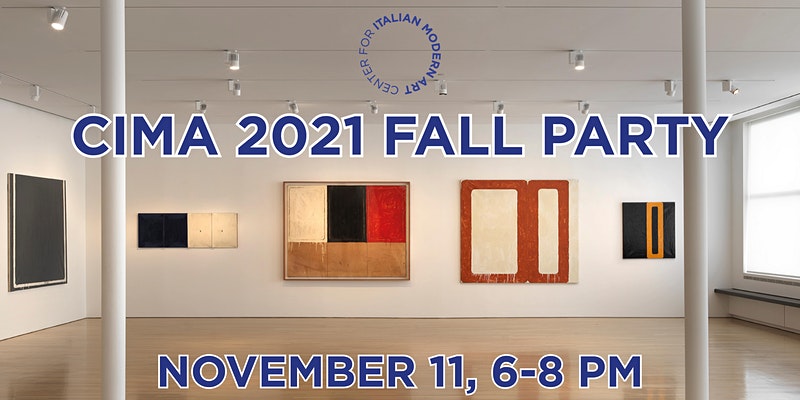
Join us in a farewell celebration of Facing America: Mario Schifano 1960-65 by coming to CIMA’s 2021 Fall Party, to be held on November 11, 2021, from 6-8 pm!
Tickets start at $20 for CIMA Members.
The evening will include:
-A talk with Dr. Francesco Guzzetti, curator of Facing America: Mario Schifano 1960-65
-An overview of the 2021 season, and a preview of 2022
-A donation drive
-Refreshments
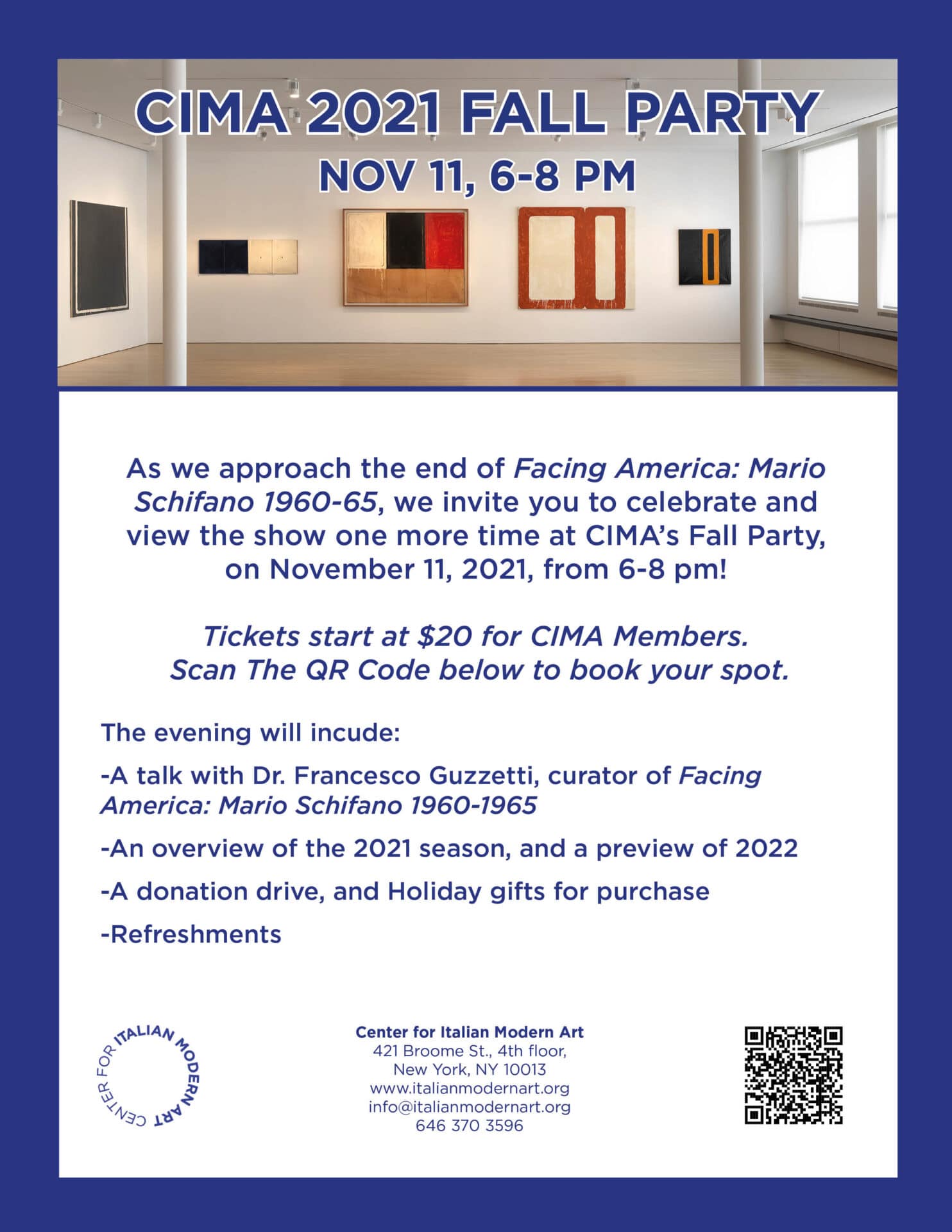
A Night among the Poets: Conversations on Ekphrasis
November 05, 2021
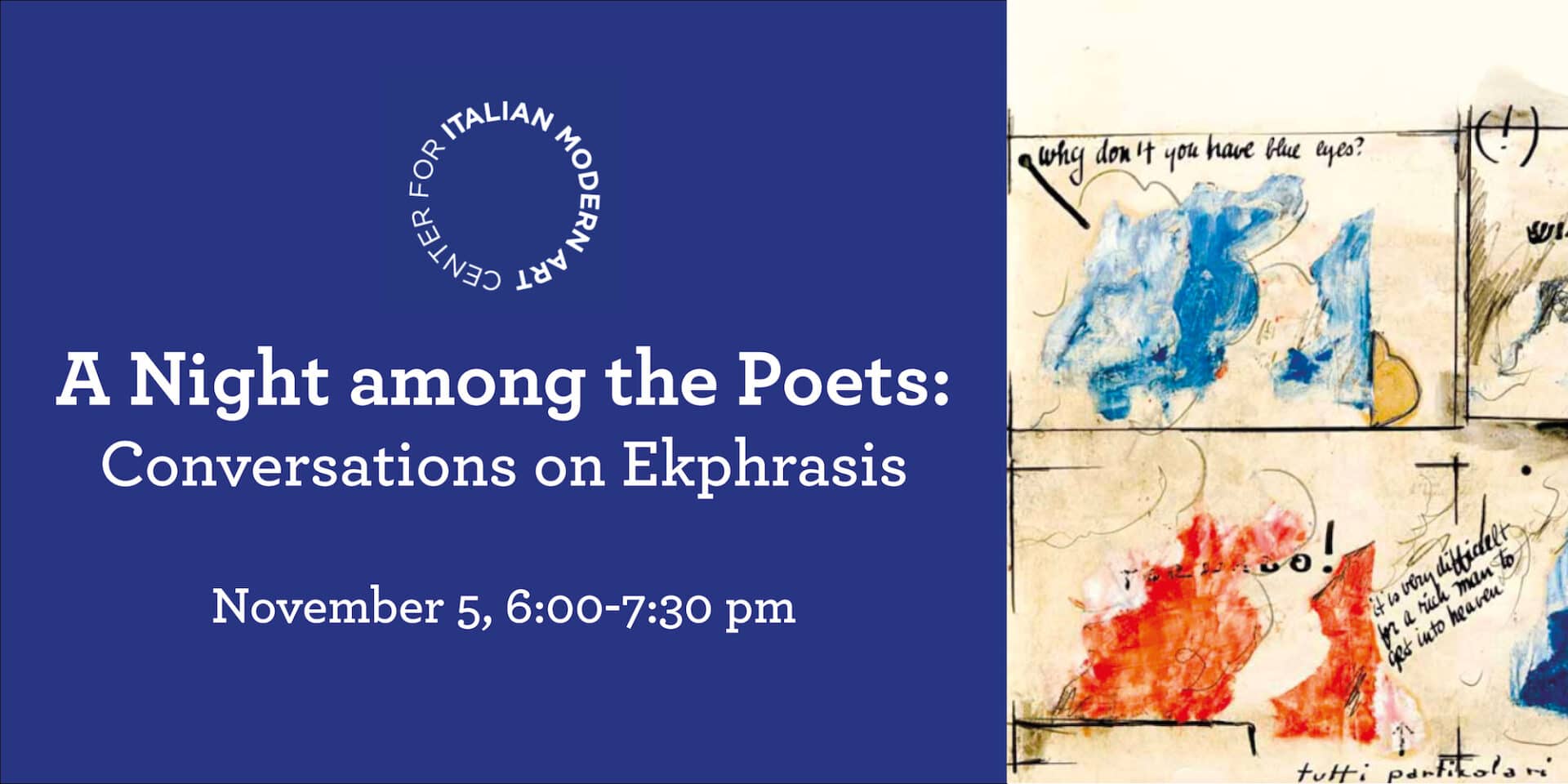
As our Mario Schifano season comes to its conclusion, let’s celebrate the creative writers in our community with a special event at the crossroads between art and literature!
Mario Schifano’s art has been a constant source of inspiration for writers and poets, from the Words and Drawings collaboration between Schifano and Frank O’Hara, to the poems dedicated to Schifano by Gerard Malanga and Dacia Maraini. Schifano’s visual universe is a repository of images and emotions that writers have explored in prose and verse.
The event will start with a fellow-guided tour of our current exhibition, Facing America: Mario Schifano, 1960-1965. After the tour, writers in attendance will have an opportunity to sit in front of the artworks and attend to the composition of short poems. We hope you will agree to share your poems with CIMA, and the best ones will be published in our social media accounts! .
Light refreshments will be served at the beginning of the event.
General Admission: $15
CIMA Members: Free

